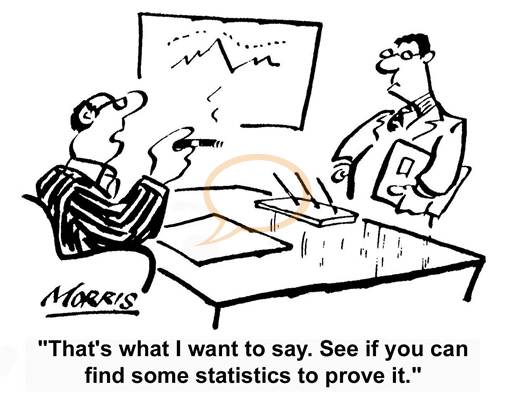Following
the Age of Reason, the concept of ethics has virtually dominated the academic
circle. Strict ethical standards are put in place to combat the rise of
unethical research. Nurses have to abide the ethics of their fields, as
biologists too have to strictly follow their ethical code when conducting
researches. This is the general rule for every field, and the same standard of
ethics applies when it comes to the world of statistics and data analysis.
Statisticians have to work with a large number of data sets, and given that
most data set require a computer program to run them, statisticians can
manipulate the data so that the outcome they want matches with their original
prediction.
Siddhartha Kalla mentions,
"It is relatively simple to manipulate and
hide data, projecting only what one desires and not what the numbers actually
speak..." (2010). Statistics is a game of numbers, and an effective
correlation cannot be established if a statistical program does not suggest a
good correlation between one number and another. For instance, the Heritage
Foundation, a conservative foundation, asks its statisticians to conduct a
research on how the Americans view the State of Israel. It is
well known that the Foundation has a pro-Israeli philosophy, and one
can easily guess that the Foundation's initial intention should be to present a
message that speaks on behalf of the State of Israel. However, as statisticians
run their data, the data might suggest otherwise. Given this situation,
statisticians do still have control over the data and they can manipulate
however they want.
Such problems are mostly seen in the areas of public service
and government. Statisticians, like most other people, also have
deeply-held political beliefs. For many statisticians who work for the state or
federal government, political parties, interest groups, and other politically
active groups, the interest of their employer could easily outweigh the ethical
interest of statistics.
At times of elections, it is more likely that the Department
of Labor's job comes with a positive message. Greg Hunter, who blogs for a
watchdog group, mentions that the Department of Labor always uses the data of
seasonally adjusted jobs while producing a positive job report. According to
him, "seasonal
adjustment jobs are created out of thin air and are not really there for people"
(Hunter, 2011). He also mentions
that the unemployment rate has been increasing in the U.S, contrary to
President Obama's claim that it is decreasing. We cannot easily discredit
Hunter's claim, since the combination of numbers with politics can easily allow
the latter to gain substantial benefits.
I personally believe that
statisticians who work for a politically active group have a higher chance of
manipulating data. Extreme political polarization symbolizes today's political
culture, and this has further developed into a culture in which a neutral
data can be easily transformed into a biased one. Bureaucrats
are also highly immune to engage in such activities, as what they report
determines their staying in power. This does not mean that bureaucrats and political
active people have always reported biased news, but their chance of doing so is
much higher than other statisticians who do not work for a politically active
group. It is also imperative to remember that the Census Bureau
employs many statisticians, and it has to be noted that those statisticians
have no interest in manipulating the data, given that their job has a neutral
outlook.
Such unethical acts are not
only limited to political areas, but a telephone company can also present a data
that can help to get more customers. If the company carries out a survey to
learn about customer satisfaction, but it only picks 20 customers to
participate in the survey. The participant of 20 customers is not statistically
significant, so the conclusion of the survey cannot be trusted. Encouraged by
private interests and corporate profits, anybody can do it. So it is very
essential for statisticians to embrace the virtue of ethics before they abide
by the unethical policy of their employer.
Therefore, there are many areas
in which statisticians can engage in unethical acts. But every statistician has
to remember the fact that the conclusion they draw from a data set can affect
the lives of many people. The right conclusion made by an epidemiologist or
a bio-statistician can prevent the spreading of diseases. Similarly,
government statisticians and corporate statisticians have to report what the
numbers suggest, not what their employers would have wanted the numbers to
suggested. This means that the proper evaluation and interpretation of numbers
will lead us toward the truth, which is the only goal of statistical
research.
References
Hunter, Greg. "9% Unemployment Rate is a Statistical Lie | Greg Hunter’s USAWatchdog." Real News from Greg Hunter’s USAWatchdog: Economic News and Breaking News Reports. N.p., 2 July 2011. Web. 22 July 2013. <http://usawatchdog.com/9-unemployment-rate-is-a-statistical-lie/>.
Kalla , Siddharth . "Ethics in
Statistics - Avoid Mispresentation of Data in Research." Immunizing
Against Nonsense - ...and making better brains for science. N.p., 16 Apr.
2010. Web. 22 July 2013. <http://explorable.com/ethics-in-statistics>.
http://www.shadowstats.com/imgs/sgs-emp.gif?hl=ad&t=1373030154.




No comments:
Post a Comment